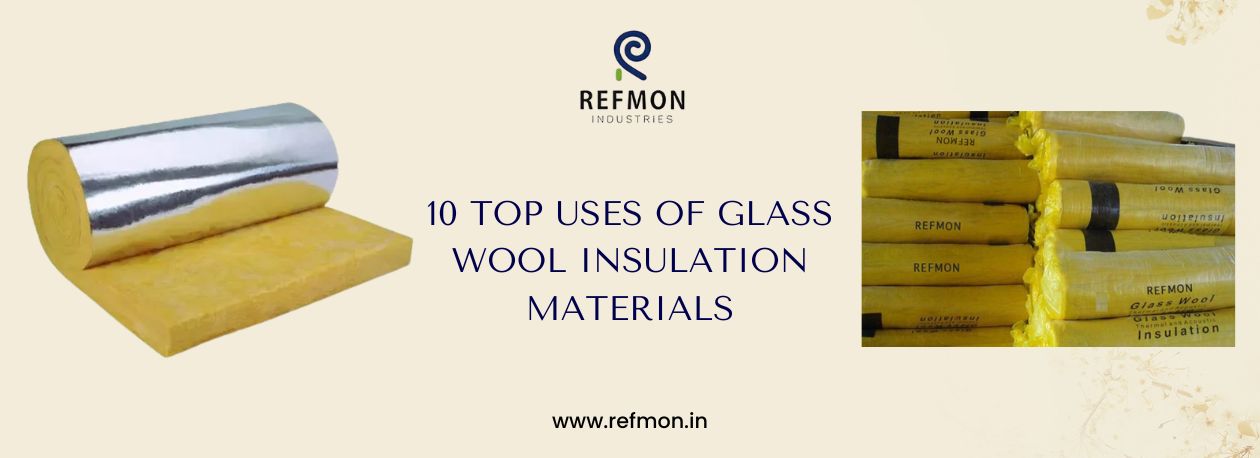
10 Top Uses of Glass Wool Insulation Materials
The adaptable and efficient hot insulation material known as Glass Wool Insulation finds broad usage throughout residential, commercial, and industrial buildings. This type of Insulation achieves both excellent thermal performance and acoustic insulation benefits through fiberglass strands woven into flexible and lightweight textiles. This versatile insulation material finds its applications in different areas which you will explore together with an explanation of its broad-scale popularity across industries.
1. Residential Insulation
Homeowners frequently use Glass Wool Insulation for wall and attic insulation and floor insulation. This material brings comfort to interior spaces throughout the summer and winter seasons therefore offering an optimal choice for energy-efficient residential construction.
2. HVAC Duct Insulation
Insulation for Heating Ventilation and Air Conditioning (HVAC) systems must be installed for the purpose of maintaining uniform temperatures and reducing energy waste. As a dependable heat insulation material glass wool efficiently distributes heating and cooling to residential as well as commercial structures.
3. Industrial Pipe Systems
The insulation process for high-temperature pipe runs at industrial facilities uses Glass Wool Insulation. The material provides thermal protection by reducing heat loss and stops condensation formation while offering hand and finger burn defense for workers when they accidentally touch it.
4. Roof Insulation
Because of its low weight Glass wool works well as a roofing insulation solution for commercial buildings and industrial complexes. A roof gains insulation properties by simply having Glass Wool installed as a roof layer to create energy-efficient and comfortable indoor conditions.
5. Soundproofing Recording Studios and Theaters
The effective control of sound waves depends on glass wool's capability as a sound insulation material which ranks among the best choices. The use of glass wool represents a standard practice for sound improvement and sound insulation throughout the studios theaters and cinemas.
6. Insulating Industrial Equipment
The majority of industrial equipment runs at elevated temperatures which needs appropriately designed insulation. Glass Wool Insulation offers machines and their components including furnaces and boilers a dual benefit of operational safety and energy performance improvement through its barrier function.
7. Partition Walls in Commercial Buildings
Glass wool partitions serve as thermal as well as acoustic insulation elements within most commercial areas. Glass wool serves as insulation to produce constant temperatures inside spaces while eliminating outside noise which leads to an environment supportive of effective work.
8. Cold Storage Facilities
Glass Wool Insulation functions equally well to insulate against cold temperatures in addition to its original hot-temperature insulation application. The insulation properties of glass wool keep cold storage facilities at low temperatures which protects perishable stored goods from damage.
9. Transportation Industry
Glass Wool Insulation promotes temperature control and acoustical insulation for transportation vehicles which include buses, trains, and shipping containers. The durability along with its low weight makes glass wool insulation an effective solution for vehicle insulation applications.
10. Energy-Efficient Building Projects
The construction industry depends on glass wool as it fulfills strict energy-saving standards for modern green buildings. Due to its outstanding ability to regulate heat glass wool enables energy reduction which supports both sustainable energy practices and decreased greenhouse gas production.
Conclusion
Glass Wool Insulation delivers advantages that extend past its thermal insulating properties. The product stands out because of its lightweight nature alongside affordable rates and its fire-resistant properties along with environmental friendliness. Glass Wool Insulation provides a dependable option as a hot insulation material for multiple industries because it works well in different environmental applications.
Different applications that include Glass Wool Insulation provide users and businesses with better acoustic performance and superior thermal efficiency alongside enhanced safety advantages. Upgrading your insulation systems should include an evaluation of the exceptional benefits offered by this insulation material.